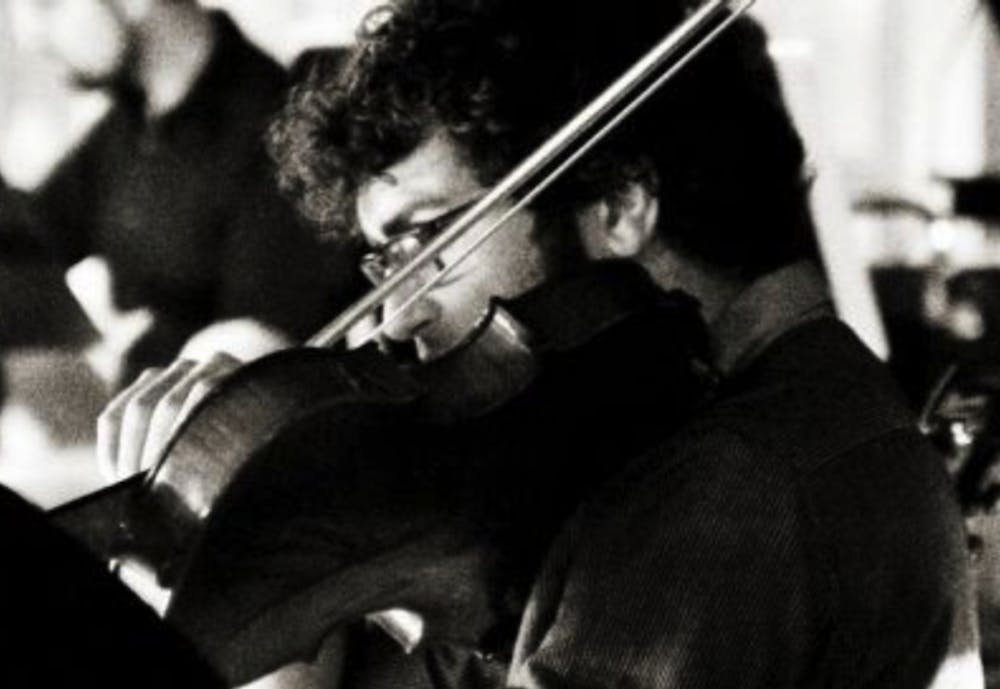Duke New Music Ensemble — also known as [dnme] — was always rooted in innovation, but never more so than this semester.
Founded over a decade ago, [dnme] focuses on performing music from the late 1900s and the 2000s, as well as original pieces from Duke student composers. While the ensemble does not eschew classical notation, the group’s repertoire encompasses a wide variety of genres and instruments and is open to musical experimentation.
This semester, the ensemble will be led by Dr. Verena Mösenbichler-Bryant, the Director of Undergraduate Studies for the Department of Music. In a typical year, the ensemble is led by a graduate student in the music program, but the department decided to put Mösenbichler-Bryant — who also directs the Duke University Wind Symphony — in charge of the spring season. Since the ensemble was inactive during the fall semester, this will be their first endeavor into remote programming.
“I think it's important to find creative ways to make music virtually. We all miss the in-person interaction of music making … so much and none of the virtual projects can replace it. We tried so many different things last semester and since COVID started, we find what students miss the most is music making with each other,” Mösenbichler-Bryan said. “It's ... not just a creative outlet for them but also it's just really a way to connect with other peers. It will be a small group of students that are participating in [dnme] but every voice will have a chance to be heard.”
The primary piece of programming for the semester will entail ensemble members meeting virtually once a week to explore the possibilities of remote, online performance.
“There's a huge delay issue with Zoom and it has to do with the internet connectivity and just the way Zoom processes what information is received,” Mösenbichler-Bryant said. “The ... issue really impacts how we can perform together. It just doesn't work.”
Mösenbichler-Bryant’s intention for the ensemble’s season of virtual meetings is to work around these technological challenges. She intends to explore virtual gathering platforms that might allow the group to evade the delay issue altogether, but she also intends on having members play around with pieces she has gathered that were written specifically with the notorious lag in mind.
“Anyone who has some sort of performing ability can join this ensemble. The flexibility of the [dnme] is beautiful because we're looking really for pieces that work for the ensemble,” Mösenbichler-Bryant said. “It will depend on who you can have on Zoom. The goal is really to explore with the Zoom platform and to see how we can make that delay work for us.”
Additionally, the ensemble will collaborate with major figures in the Duke Arts world, such as Duke Performances and vice provost for the arts John Brown, on what Mösenbichler-Bryant called a “play-along” performance.
For this performance, a rendition of Steven Bryant’s 2017 piece, “The Low Arc of the Sun,'' will become a virtual community gathering. John Brown and the Ciompi Quartet, who participated in Duke Performance’s fall season, pre-recorded a track playing their instruments’ parts in Bryant’s piece. In March, Mösenbichler-Bryant intends on putting out a call to the general community — anyone who would like to play along with Brown and Ciompi Quartet can do so by submitting a video of themselves performing the piece on their instruments.
The project will also include a Q&A session with composer Steven Bryant and a virtual rehearsal prior to the filming of submissions.
“In early March, we will take all the submissions that we have received and we'll put them on top of the Ciompi Quartet and John Brown track, and then we'll have created basically a full string orchestra,” Mösenbichler-Bryant said. “That's a project that will then be shared as part of a virtual [dnme] concert.”
Each semester, Mösenbichler-Bryant explained, what the [dnme] does is a little different because the ensemble takes on the unique identities of those directing and participating in it and then it never looks quite the same again. While using this semester’s especially unique virtual circumstances for creative exploration, she also hopes that it will be the only semester where ensemble members will have to work remotely.
“I think that such an important part of our ensembles is our connection to the students. Music making is about communication, it's about interaction, it's about listening to each other. And all these things unfortunately can't be replaced,” Mösenbichler-Bryant said. “I think they're grateful that we're trying to create opportunities for them. But everyone understands that it's not the same. And it can't be the same.”
For now, though, Mösenbichler-Bryant believes that joining [dnme] is a great opportunity for any students interested in exploring “what is possible and how we can be creative together in this virtual space.”
“You know, sometimes things won't work,” Mösenbichler-Bryant said. “We'll just use that and grow forward.”
To learn more about [dnme], contact verena.m@duke.edu. All instruments and levels are welcome.
Get The Chronicle straight to your inbox
Sign up for our weekly newsletter. Cancel at any time.

